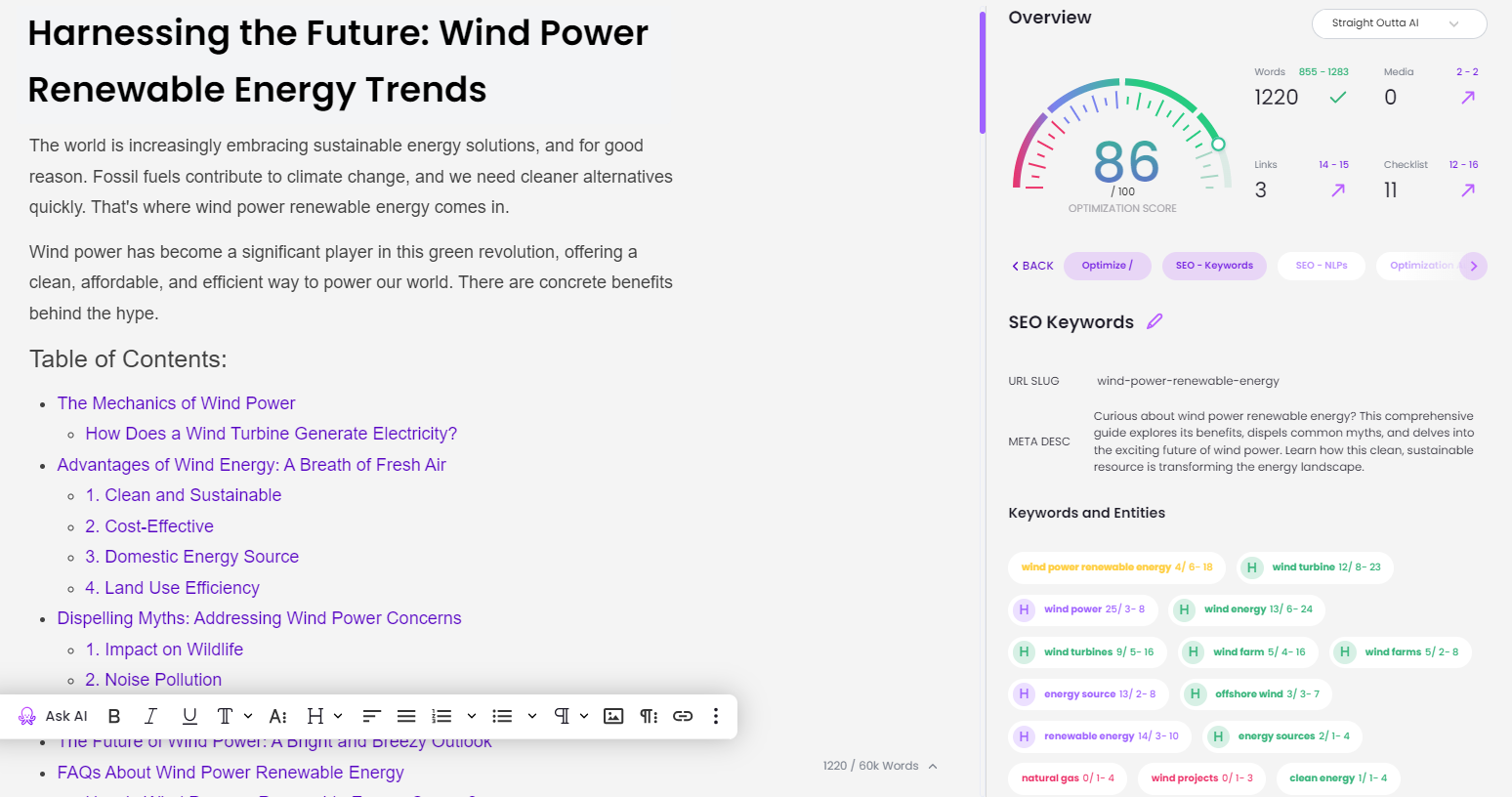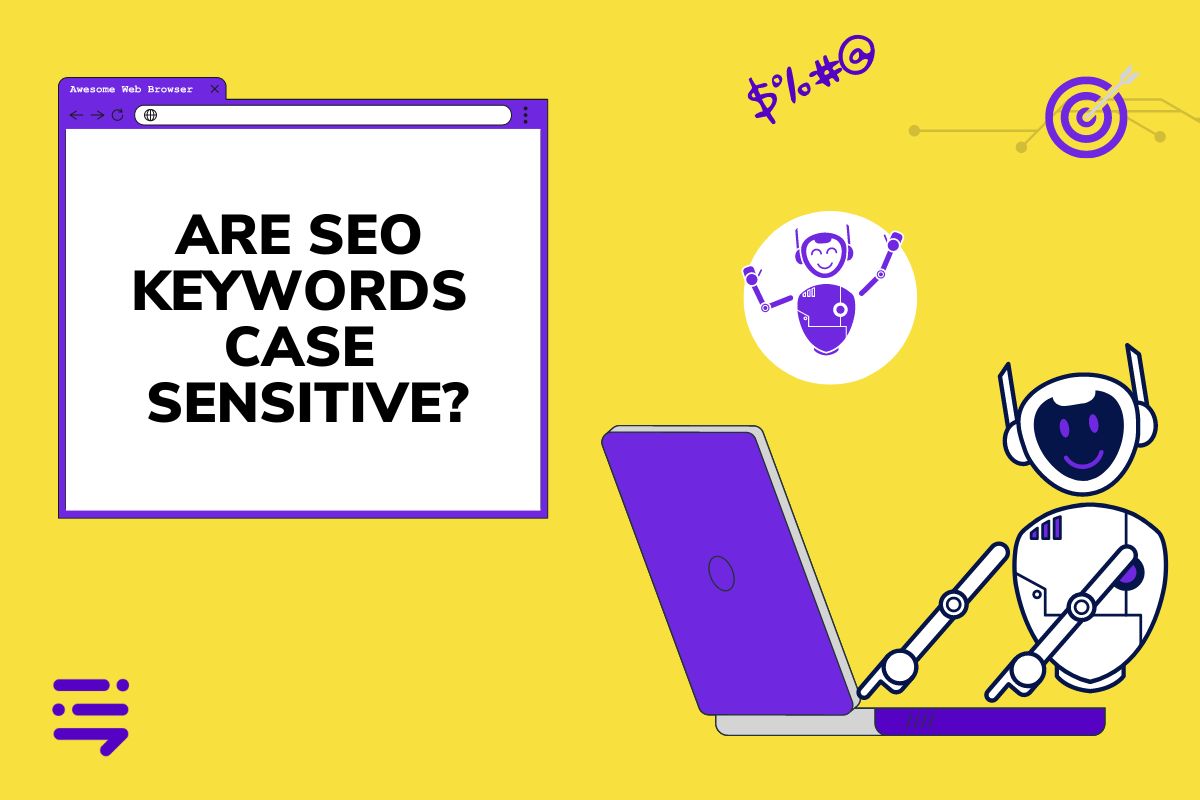No, SEO keywords are not case-sensitive in most search engines. Whether you use uppercase or lowercase letters in your keywords, it won’t affect the search results.
However, it’s still good practice to maintain consistency in your keyword usage for clarity and readability. Some search engines may interpret mixed cases differently so it’s wise to stick to a consistent format throughout your content.
While it’s important to pay attention to your keywords, obsessing over their capitalization might not be the best use of your time. Let’s find out when are SEO keywords case sensitive and how they impact your SEO strategy.
Table Of Contents:
- Are SEO Keywords Case Sensitive?
- Create a Style Guide for Consistency
- SEO Best Practices Beyond Keywords
- FAQs: Are SEO Keywords Case Sensitive?
- Conclusion
Are SEO Keywords Case Sensitive?
Historically, early search engines were more primitive and case-sensitive. But modern search engines like Google, Bing, and Yahoo have evolved significantly.
Google’s Approach:
Google treats keywords as case-insensitive.
This means that “SEO Tips”, “seo tips”, and “SeO TiPs” are all interpreted the same way by Google’s algorithms.
This case insensitivity extends to the entirety of a web page’s content, including meta descriptions, titles, and body text.
Google’s sophisticated algorithms are designed to understand the context and semantics of search queries, making the case of the letters irrelevant.
Other Search Engines:
Similar to Google, other major search engines like Bing and Yahoo also treat keywords as case-insensitive.
They have adopted this approach to provide a more seamless and intuitive user experience.
By disregarding case sensitivity, these search engines can better match user queries with relevant content, regardless of how the user capitalizes their search terms.
Indexing and Ranking
When search engines like Google index websites, they convert all the text to lowercase to make searching more efficient.
This way, it doesn’t matter if you capitalize keywords in your search query or if the website’s content uses uppercase or lowercase letters.
Click-Through Rates
Although search engines do not differentiate based on letter case, using proper capitalization in meta descriptions and titles can improve click-through rates.
Titles like “Top 10 SEO Tips for Beginners” are more inviting and easier to read than “top 10 seo tips for beginners”.
URL Structure
It’s important to note that while search engines treat keywords in content as case-insensitive, URLs can be case-sensitive.
This means that “example.com/SEOTips” and “example.com/seotips” could be treated as two different URLs by web servers, potentially leading to duplicate content issues.
It’s best practice to use consistent, lower-case URLs to avoid such complications.
Anchor Text
When using anchor text for internal linking, the case does not affect the SEO value of the keywords.
However, for user experience, it’s best to use a consistent and readable format.
Exceptions to the Rule
While search engines generally ignore keyword capitalization, there are some exceptions to keep in mind.
For example, if a search query includes proper nouns, such as brand names or person names, the capitalization may matter.
Search engines may display results that match the exact capitalization used in the query.
However, this is more related to matching user intent rather than a strict case-sensitive ranking factor.
Create a Style Guide for Consistency
Crafting a consistent brand image starts with attention to detail – even in something as simple as capitalizing keywords. This might not be a direct ranking factor, but it indirectly boosts your SEO by improving user experience and credibility.
When you prioritize proper keyword capitalization, you create a more readable and engaging experience for your website visitors.
Inconsistent capitalization can be a major turnoff, so sticking to standard practices is key to enhancing your website’s professionalism and user experience.
Create a unified visual identity across your online presence by establishing a style guide for keyword capitalization in your website content, meta tags, and marketing materials. Stick to it, and you’ll project a polished, professional image.

Infographic from Seobility Wiki
SEO Best Practices Beyond Keywords
Case sensitivity in keywords is just one part of the SEO puzzle. Here are some additional best practices to enhance your SEO strategy:
Create Valuable Content
Beyond keyword capitalization, it’s more important to create high-quality, informative, and engaging content that answers the key questions, concerns, and needs of your target audience.
Develop in-depth content that provides valuable insights and solutions. By offering comprehensive and relevant content, you increase the likelihood of ranking well in search results.
Focus on Readability
While case sensitivity is not a concern for search engines, maintaining a consistent approach to capitalization in your content is still important for readability and brand perception.
A consistent style makes your content more professional and easier to read, which can indirectly affect user engagement metrics that search engines take into account.
Use proper grammar, punctuation, and capitalization to ensure your content is easy to read and understand.
Break up long paragraphs into shorter, more digestible sections.
Use headings, subheadings, and bullet points to organize your content and improve scannability.
By enhancing readability, you provide a better user experience and increase the chances of engagement and conversions.
Match User Intent
When optimizing for keywords, focus on understanding and matching user intent rather than getting hung up on capitalization.
Analyze the search queries your target audience uses to find your products or services.
Incorporate those keywords naturally into your content, using proper capitalization based on grammar rules and readability.
On-Page SEO
On-page SEO is all about fine-tuning the individual pages on your website to make them more appealing to search engines and, ultimately, to users.
Keywords are a big part of on-page SEO — sprinkle them naturally throughout your titles, headings, and body text without going overboard. Aim for a mix of popular terms and more specific long-tail keywords that match what people are searching for.
But it’s not just about the words on the page. The technical elements matter too. Your title tags and meta descriptions should be catchy and include your main keyword to boost click-through rates. Organizing your content with H2-H5 header tags helps both readers and search engines make sense of your information.
And don’t forget to link your pages! Internal links are like breadcrumbs, guiding visitors to other valuable content on your site and improving their experience.
With BrandWell, you’ll never have to worry about on-page SEO for your content. Each long-form blog post generated by the app is already optimized for SEO — keywords in strategic places, long blocks of text split into sections with proper H2-H3 tags, and internal/external links automatically added to the article.

Technical SEO
Technical SEO is all about making sure the technical aspects of your site are solid so search engines can easily crawl, index, and rank your pages.
For starters, you need to have a clear site architecture, a well-configured robots.txt file, and an XML sitemap that helps search engines find all your important content. Plus, you want to make sure there are no broken links or errors that might block indexing.
Speed is also a huge part of technical SEO. Fast loading times improve user experience and can boost your rankings. Compressing images, minimizing JavaScript and CSS files, and leveraging browser caching can all help speed things up.
Mobile optimization is another important aspect of technical SEO. Most people are searching on their phones these days so your site needs to look and perform well on smaller screens.
Structured data, like schema markup, helps search engines understand your content better and can lead to those eye-catching rich snippets in search results.
And don’t forget about canonical tags — they prevent duplicate content issues by indicating the original version of a page. By getting these technical details right, you’re setting your site up for SEO success.
Backlinks and Authority
One of the main factors search engines consider when ranking websites is the quality of backlinks pointing to your site.
Focus on attracting links naturally by producing exceptional content, leveraging broken links, and guest blogging on reputable sites.
When it comes to search engines, the quality and quantity of backlinks pointing to your website are the measuring sticks of its credibility and relevance.
FAQs: Are SEO Keywords Case Sensitive?
Does capitalization matter in SEO?
No, search engines like Google treat keywords as case-insensitive. “SEO” and “seo” are the same.
Are Google ads keywords case-sensitive?
No, Google Ads treats all keyword variations equally regardless of letter case.
Should keywords be lowercase?
You should use lowercase for consistency and readability but it doesn’t affect ranking.
Are HTML keywords case-sensitive?
No, HTML tags aren’t affected by capitalization. Use consistent casing for cleaner code.
Conclusion
So, are SEO keywords case sensitive?
The short answer is no. Search engines are smart enough to understand the intent behind your keywords, regardless of whether they’re uppercase, lowercase, or a mix of both.
Consistency is crucial when it comes to keyword capitalization. If you choose to capitalize a keyword in one place, stick to that decision throughout your post. This creates a seamless, easy-to-read experience for your audience.
By focusing on creating valuable content, improving user experience, and building authority through quality backlinks, you’ll be well on your way to SEO success — regardless of how you capitalize your keywords.




